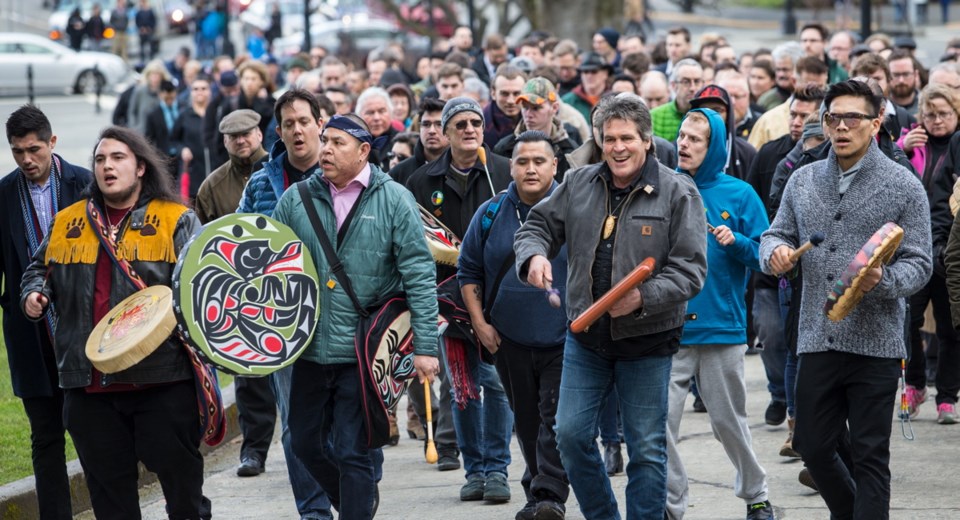About 250 people, most of them First Nations men, marched to the legislature Thursday, committing themselves to stopping violence against women and children.
The march was part of an annual day of workshops, ceremony, education and spiritual awakening in Victoria organized by the Moose Hide Campaign.
John Rustad, the B.C. minister of aboriginal relations, and Nicholas Simons, NDP MLA for Powell River, congratulated the campaigners and proclaimed Feb. 16 Moose Hide Campaign Day.
“I am so pleased to see this grow and see so many people coming together to be part of a positive voice for change,” Rustad said. “It is needed and is long past time.”
Participants in the Moose Hide Campaign identify themselves as committed to ending violence against women and children with a small square of moose hide pinned to their lapels, a gesture similar to the coloured ribbons worn by supporters of other campaigns.
The grassroots Moose Hide Campaign targets men and boys, encouraging them to stand up against violence toward women and children. It began six years ago with Paul Lacerte and his daughter Raven, 22, who had been hunting, killing a moose that would help feed the family for the winter.
The pair were near Prince George on Highway 16, known as the “Highway of Tears” because of the large number of women, many of them First Nations, who have been found murdered along it or reported missing while travelling it. Police say there are about 20 victims, but many First Nations communities say it is more than 40.
As the pair, who now live in Victoria, talked about the highway, their conversation grew into a broader one about violence against women. They also talked about its effect on First Nations communities.
Determined to take action, Raven and her sisters cut the first 25,000-odd squares of moosehide themselves before embarking on the campaign.
Initially aimed at First Nations men, the campaign has expanded to include non-aboriginal men.
Thursday’s march was part of a day that included fasting and self-examination. Many of the participants came to tears as they discussed their histories and feelings. They heard a call for new “warrior spirit” to take an anti-violence stand.
“I am so grateful to all of you for being here today and to take a stand to say: ‘Violence is not OK and is never welcome,’ ” Raven Lacerte said.
“It makes me feel so safe, loved and respected.”
Paul Lacerte said it’s important for all men to stop, examine themselves and admit their past histories to bring an end violence against women and children. They can start by asking for forgiveness.
“We are not be up here to make ourselves look big, but instead to make ourselves look small and to humble ourselves and try to be better as men,” he said.
“Every single man is here today because we all want to hear our own daughters say they feel safe, loved and respected.”



